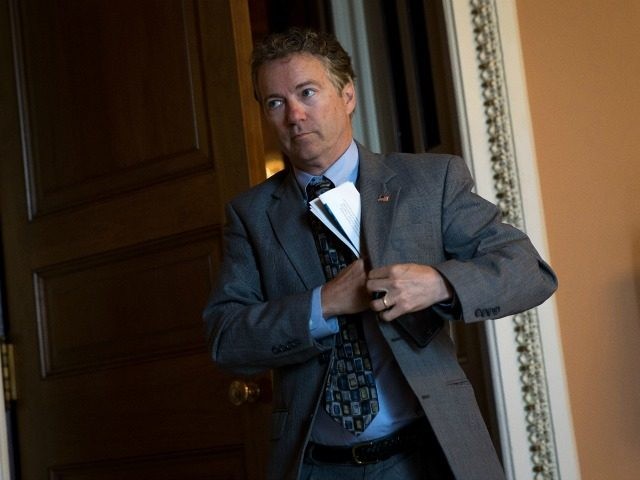Kentucky’s Sen. Rand Paul appears to be on the cusp of having the Senate and the House pass the “Audit the Fed” legislation that he and his father, former Rep. Ron Paul (R-TX), fought for to stop the Federal Reserve’s “unchecked” and “arguably unconstitutional” meddling in the free market economy.
Sen. Paul’s 2016 Federal Reserve Transparency Act finally received bipartisan support, with almost unanimous Republican support and support from Democrat Senators Tammy Baldwin (D-WI) and Vermont independent Sen. Bernie Sanders. But the bill fell short of the 60 votes needed for consideration after Senate Democrats leadership shot it down.
But with more Republicans on his side — and the support of President-elect Donald Trump — Paul reintroduced the Federal Reserve Transparency Act as Senate Bill 16. With the Democrat leadership licking their election wounds and unwilling to oppose something the public has supported by over 70 percent since 2013, the bill looks to pass the Senate and then move on to an easy pass in the House as H.R. 24.
“No institution holds more power over the future of the American economy and the value of our savings than the Federal Reserve,” said Sen. Paul, “yet Fed Chair Yellen refuses to be fully accountable to the people’s representatives.”
“The American public deserves more insight into the practices of the Federal Reserve,” said House sponsor Rep. Massie (R-TN). “Behind closed doors, the Fed crafts monetary policy that will continue to devalue our currency, slow economic growth, and make life harder for the poor and middle class.”
The influential Left-leaning Naked Capitalism blog chimed in that “the audit is necessary after the “extraordinary, extra-legislative measures taken to rescue financial institutions in the wake of the financial crisis.” They quoted former IMF Chief Economist Simon Johnson, who called the Fed’s actions over the last 8 years a “quiet coup.”
The audit was proposed as a 2010 bipartisan amendment from Rep. Paul and Democrat Representative Alan Grayson (FL) to the Dodd-Frank Act during the financial crisis as a one-time audit of the central bank’s emergency lending programs.
The bill would have given the Government Accountability Office (GAO) one year to audit the Federal Reserve’s Board of Governors and Reserve Banks, plus 90 days to report its findings to Congress. But it quietly died when Sen. Chuck Schumer (D-NY) led the opposition.
Wall Street allies have opposed an independent oversight audit of the Federal Reserve Bank because they say the U.S. central bank is already “audited.” But the Fed is unique in being currently exempt from certain standards for its monetary policy decision-making, transactions with foreign entities, and transactions directed by the Federal Open Market Committee.
Editor Yves Smith of Naked Capitalism complimented Sen. Paul’s persistence:
“The sorry fact is that the Fed has for far too long been able to shield its operations from democratic oversight and accountability by claiming it need to be independent. That is code for ‘democracies like to spend too freely and create too much inflation.’ And the tacit assumption is that economic mandarins, in the form of central bankers, therefore need to be shielded from public pressure.”

COMMENTS
Please let us know if you're having issues with commenting.